5 jan 2020
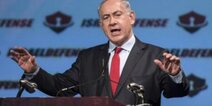
PM says the move to eliminate Iran's hardline general is 'worthy of all appreciation,' adding the head of Quds Force 'planned and carried out many terror attacks' in the Mideast and beyond
Prime Minister Benjamin Netanyahu says President Donald Trump is "worthy of all appreciation" for ordering the killing of Iranian Gen. Qassem Soleimani.
Gen. Qassem Soleimani, the head of Iran's elite Quds Force and mastermind of its regional security strategy, was killed in an airstrike early Friday near the Iraqi capital's international airport that has caused regional tensions to soar.
Netanyahu told his cabinet Sunday that Soleimani "initiated, planned and carried out many terror attacks" in the Middle East and beyond. Israel has long accused Soleimani of being the mastermind of Iran's belligerency in the region.
"Qassem Soleimani brought about the death of many American citizens and many other innocents in recent decades and at present," Netanyahu said. "President Trump is deserving of all esteem for taking determined, strong and quick action."
Netanyahu said Israel "fully stands" alongside the United States in its current campaign against Iran.
Netanyahu has been among the strongest voices against Iran's Islamic rulers in recent years. The Israeli leader pushed hard against the nuclear deal Western powers signed with Tehran in 2015 and which Trump later reversed.
The United States killed Soleimani in a drone airstrike at Baghdad's international airport early Friday. The Iranian commander was widely seen as the architect of Tehran's proxy wars in the Middle East.
Prime Minister Benjamin Netanyahu says President Donald Trump is "worthy of all appreciation" for ordering the killing of Iranian Gen. Qassem Soleimani.
Gen. Qassem Soleimani, the head of Iran's elite Quds Force and mastermind of its regional security strategy, was killed in an airstrike early Friday near the Iraqi capital's international airport that has caused regional tensions to soar.
Netanyahu told his cabinet Sunday that Soleimani "initiated, planned and carried out many terror attacks" in the Middle East and beyond. Israel has long accused Soleimani of being the mastermind of Iran's belligerency in the region.
"Qassem Soleimani brought about the death of many American citizens and many other innocents in recent decades and at present," Netanyahu said. "President Trump is deserving of all esteem for taking determined, strong and quick action."
Netanyahu said Israel "fully stands" alongside the United States in its current campaign against Iran.
Netanyahu has been among the strongest voices against Iran's Islamic rulers in recent years. The Israeli leader pushed hard against the nuclear deal Western powers signed with Tehran in 2015 and which Trump later reversed.
The United States killed Soleimani in a drone airstrike at Baghdad's international airport early Friday. The Iranian commander was widely seen as the architect of Tehran's proxy wars in the Middle East.

The Israeli military closed a ski resort in the occupied Syrian Golan Heights, on Saturday, due to concerns over what it calls possible threats from Iranian-backed groups in Lebanon and Syria, or Palestinian resistance movements Hamas and Islamic Jihad in Gaza, Days of Palestine reported.
The closing of the Mount Hermon resort, which was the target of a previous missile attack, came after the Pentagon confirmed that US President Donald Trump had ordered the assassination of Qassem Soleimani, the head of Iran’s elite Quds Force.
“Considering the situation, it was decided that the Hermon site would not be open to visitors today,” said the Israeli army in a tweet. “There are no additional guidelines for Golan residents, and the routine continues.”
Israel’s Defense Minister, Naftali Bennett, called for a situation assessment with the heads of the defence establishment at military headquarters in Tel Aviv.
Meanwhile, Prime Minister Benjamin Netanyahu’s visit to Greece was cut short, returning to Israel amid fears that Iran will exact revenge on the occupation state for America’s assassination of the Iranian general.
Netanyahu arrived in Athens on Thursday for a meeting with the leaders of Greece and Cyprus over the construction of a pipeline that would take Palestinian and Cypriot natural gas to Europe via Greece.
The Palestinian Islamic Resistance Movement, Hamas, has condemned the US assassination of the senior Iranian military commander, as did Islamic Jihad.
Soleimani was killed in a US air strike in Iraq on Friday. In separate statements, both Palestinian factions put the instability in the region down to Washington’s unconditional support for the occupation state of Israel.
The closing of the Mount Hermon resort, which was the target of a previous missile attack, came after the Pentagon confirmed that US President Donald Trump had ordered the assassination of Qassem Soleimani, the head of Iran’s elite Quds Force.
“Considering the situation, it was decided that the Hermon site would not be open to visitors today,” said the Israeli army in a tweet. “There are no additional guidelines for Golan residents, and the routine continues.”
Israel’s Defense Minister, Naftali Bennett, called for a situation assessment with the heads of the defence establishment at military headquarters in Tel Aviv.
Meanwhile, Prime Minister Benjamin Netanyahu’s visit to Greece was cut short, returning to Israel amid fears that Iran will exact revenge on the occupation state for America’s assassination of the Iranian general.
Netanyahu arrived in Athens on Thursday for a meeting with the leaders of Greece and Cyprus over the construction of a pipeline that would take Palestinian and Cypriot natural gas to Europe via Greece.
The Palestinian Islamic Resistance Movement, Hamas, has condemned the US assassination of the senior Iranian military commander, as did Islamic Jihad.
Soleimani was killed in a US air strike in Iraq on Friday. In separate statements, both Palestinian factions put the instability in the region down to Washington’s unconditional support for the occupation state of Israel.
4 jan 2020
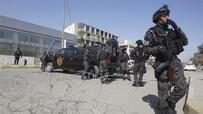
The Green Zone of the Iraqi capital, Baghdad, home to the US embassy, and the Balad Air Base, where US troops are stationed, have come under mortar shell and rocket attacks, respectively, police sources say.
On Saturday evening, at least two mortar shells targeted the Green Zone, a high-security enclave. One of them hit the Celebrations Square near the US diplomatic mission, unnamed security sources told AFP, adding that the other projectile landed close to the enclave.
Sirens immediately sounded at the American compound in the zone, which hosts both US diplomats and troops, they added.
At least two rockets, suspected to be of Katyusha type, fell in the Balad Air Base near the city of Samara in Salahuddin province, the sources further said, adding that surveillance drones were sent to locate the source of the rocket launch.
The attacks came just a day after a US airstrike assassinated Lieutenant General Qassem Soleimani, the commander of the Quds Force of the Islamic Revolution Guards Corps (IRGC), and Abu Mahdi al-Muhandis, the deputy chief of the Iraqi pro-government Popular Mobilization Units (PMU), in the Iraqi capital. Four other Iranians and four more Iraqis in their company were also martyred.
The Pentagon said in a statement that President Donald Trump ordered the US military to assassinate the top Iranian commander.
Iran has vowed a “harsh vengeance” against criminals behind Soleimani's assassination.
Additionally on Saturday, tens of thousands of people marched in Baghdad to mourn the loss of General Soleimani and Abu Mahdi.
On Saturday evening, at least two mortar shells targeted the Green Zone, a high-security enclave. One of them hit the Celebrations Square near the US diplomatic mission, unnamed security sources told AFP, adding that the other projectile landed close to the enclave.
Sirens immediately sounded at the American compound in the zone, which hosts both US diplomats and troops, they added.
At least two rockets, suspected to be of Katyusha type, fell in the Balad Air Base near the city of Samara in Salahuddin province, the sources further said, adding that surveillance drones were sent to locate the source of the rocket launch.
The attacks came just a day after a US airstrike assassinated Lieutenant General Qassem Soleimani, the commander of the Quds Force of the Islamic Revolution Guards Corps (IRGC), and Abu Mahdi al-Muhandis, the deputy chief of the Iraqi pro-government Popular Mobilization Units (PMU), in the Iraqi capital. Four other Iranians and four more Iraqis in their company were also martyred.
The Pentagon said in a statement that President Donald Trump ordered the US military to assassinate the top Iranian commander.
Iran has vowed a “harsh vengeance” against criminals behind Soleimani's assassination.
Additionally on Saturday, tens of thousands of people marched in Baghdad to mourn the loss of General Soleimani and Abu Mahdi.
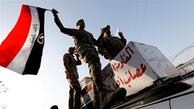
Shortly after the United States’ assassination of a senior Iranian commander in Baghdad, a fresh American airstrike hits a convoy belonging to Iraq’s anti-terror fighters north of the Arab country’s capital, reportedly killing six people.
The strike came almost exactly 24 hours after the Friday attacks that martyred Lieutenant General Qassem Soleimani, the commander of the Quds Force of Iran’s Islamic Revolution Guards Corps (IRGC), and Abu Mahdi al-Muhandis, the second-in-command of Iraq's Popular Mobilization Units (PMU), as they were travelling on the Baghdad International Airport road.
The PMU said the later attack targeting its fighters hit a convoy of medics, not senior leaders as reported in some media, near Taji stadium in Baghdad, AFP reported.
The group did not say who was responsible, but Iraqi state television reported it was a US airstrike.
The aggression killed six people and critically wounded three, an Iraqi army source told Reuters.
General Soleimani cooperated side by side with the PMU in the face of the most deadly terrorist outfits to ever afflict the region, including the Daesh Takfiri group.
The Islamic Republic has denounced Soleimani’s assassination as “an act of state terrorism,” saying it belies Washington’s claim of fighting terrorism in the region.
Tehran has said it reserves the right to respond in kind, and pledged not to abandon its contribution to regional counter-terrorism efforts.
The strike came almost exactly 24 hours after the Friday attacks that martyred Lieutenant General Qassem Soleimani, the commander of the Quds Force of Iran’s Islamic Revolution Guards Corps (IRGC), and Abu Mahdi al-Muhandis, the second-in-command of Iraq's Popular Mobilization Units (PMU), as they were travelling on the Baghdad International Airport road.
The PMU said the later attack targeting its fighters hit a convoy of medics, not senior leaders as reported in some media, near Taji stadium in Baghdad, AFP reported.
The group did not say who was responsible, but Iraqi state television reported it was a US airstrike.
The aggression killed six people and critically wounded three, an Iraqi army source told Reuters.
General Soleimani cooperated side by side with the PMU in the face of the most deadly terrorist outfits to ever afflict the region, including the Daesh Takfiri group.
The Islamic Republic has denounced Soleimani’s assassination as “an act of state terrorism,” saying it belies Washington’s claim of fighting terrorism in the region.
Tehran has said it reserves the right to respond in kind, and pledged not to abandon its contribution to regional counter-terrorism efforts.
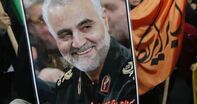
The Hamas Movement has condemned the US assassination of Iranian military commander Qassem Soleimani in Iraq as “a crime and a brutal act.”
In a press release on Friday, Hamas said that “such US crime reflected persistence in fueling tension in the region for the sake of the criminal Zionist entity.”
The Movement held the US administration fully responsible for any further bloodshed in the Arab region, affirming such aggressive behavior would fuel regional conflicts, with no regard for the Arab peoples’ interests.
It expressed its sincere condolences and sympathy to the Iranian leadership and people on the death of Soleimani, hailing his role in supporting the Palestinian resistance in its struggle against the Israeli occupation.
In a press release on Friday, Hamas said that “such US crime reflected persistence in fueling tension in the region for the sake of the criminal Zionist entity.”
The Movement held the US administration fully responsible for any further bloodshed in the Arab region, affirming such aggressive behavior would fuel regional conflicts, with no regard for the Arab peoples’ interests.
It expressed its sincere condolences and sympathy to the Iranian leadership and people on the death of Soleimani, hailing his role in supporting the Palestinian resistance in its struggle against the Israeli occupation.
3 jan 2020
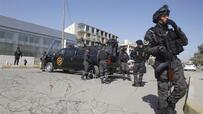
Iran's General Staff of Armed Forces has issued a statement vowing that elements behind the assassination of Major General Qassem Soleimani will face a punishing response.
"Without doubt, those who have ordered and carried out this crime will have to await a harsh response that they will regret," that statement read.
The statement came after the Trump administration confirmed that it had assassinated Major General Soleimani, the commander of the Quds Force of the IRGC.
The attack also led to the death of Abu Mahdi al-Muhandis, the second-in-command of Iraq's Popular Mobilization Units (PMU).
The General Staff of Armed Forces' statement on Friday described the assassination as a "terrorist attack " carried out by the "criminal American regime".
"The brave commander, Major General Qassem Soleimani, played a key and unique role in fighting terrorist Takfiri groups which were set up by the criminal American government," it read.
The General Staff of Armed Forces offered its condolences to the "courageous people of Iran, Iraq and all the heroic fighters of the resistance axis".
The "resistance axis" is used to refer to an emerging front in the Middle East which includes Iran, Syria and other regional countries and forces such as Hezbollah, which are opposed to US and Israeli hegemony over the region.
Soleimani was known as a top figurehead assisting regional forces fighting foreign-backed terrorist groups in the region, notably in Iraq and Syria.
'US main loser of dangerous regional game'
Iran's First Vice President Es'haq Jahangiri said that the US' war mongering criminals will end up being "the main losers in this dangerous game in the region," following the assassination of Soleimani.
Jahangiri added that those following the path of Soleimani will "push away the fire of war, terrorism and division from the region".
"The name of Soleimani struck fear in the hearts of the enemies of the independence and freedom of Muslim nations," Jahangiri said, adding that Soleimani was an inspiration and cause for hope among the "truth-seekers" and "downtrodden" of the world.
Speaking earlier on Friday, Hessamoddin Ashena, adviser to Iranian President Hassan Rouhani, also said that Washington had "passed red lines" with the assassination and that it will "have to face consequences" of the attack.
"Trump, with his gambling, has pushed the US into the most dangerous regional circumstances. One who passes the red lines will have to be ready to face its consequences," Ashena said.
"Without doubt, those who have ordered and carried out this crime will have to await a harsh response that they will regret," that statement read.
The statement came after the Trump administration confirmed that it had assassinated Major General Soleimani, the commander of the Quds Force of the IRGC.
The attack also led to the death of Abu Mahdi al-Muhandis, the second-in-command of Iraq's Popular Mobilization Units (PMU).
The General Staff of Armed Forces' statement on Friday described the assassination as a "terrorist attack " carried out by the "criminal American regime".
"The brave commander, Major General Qassem Soleimani, played a key and unique role in fighting terrorist Takfiri groups which were set up by the criminal American government," it read.
The General Staff of Armed Forces offered its condolences to the "courageous people of Iran, Iraq and all the heroic fighters of the resistance axis".
The "resistance axis" is used to refer to an emerging front in the Middle East which includes Iran, Syria and other regional countries and forces such as Hezbollah, which are opposed to US and Israeli hegemony over the region.
Soleimani was known as a top figurehead assisting regional forces fighting foreign-backed terrorist groups in the region, notably in Iraq and Syria.
'US main loser of dangerous regional game'
Iran's First Vice President Es'haq Jahangiri said that the US' war mongering criminals will end up being "the main losers in this dangerous game in the region," following the assassination of Soleimani.
Jahangiri added that those following the path of Soleimani will "push away the fire of war, terrorism and division from the region".
"The name of Soleimani struck fear in the hearts of the enemies of the independence and freedom of Muslim nations," Jahangiri said, adding that Soleimani was an inspiration and cause for hope among the "truth-seekers" and "downtrodden" of the world.
Speaking earlier on Friday, Hessamoddin Ashena, adviser to Iranian President Hassan Rouhani, also said that Washington had "passed red lines" with the assassination and that it will "have to face consequences" of the attack.
"Trump, with his gambling, has pushed the US into the most dangerous regional circumstances. One who passes the red lines will have to be ready to face its consequences," Ashena said.
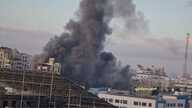
IDF heightens alertness along border regions, fearing possible retaliation by Iran-aligned groups Hamas and Hezbollah; Defense officials meet in Tel Aviv for 'situational assessment'
Defense Minister Naftali Bennett summoned Israel's military and security chiefs to Tel Aviv on Friday in the wake of the U.S. airstrike that killed senior Iranian Quds Force commander Qassem Soleimani.
As Iranian officials vowed revenge, the government of America's closest ally in the Middle East gave no immediate public response to the deaths of Soleimani and of Iraqi militia commander Abu Mahdi al-Muhandis in Baghdad.
But Army Radio said the military had gone on heightened alert, amid fears that Iran could strike through its regional allies such as Tehran-backed Lebanese movement Hezbollah to the north, or through Palestinian militant group Hamas and Islamic Jihad in Gaza.
"They will wait for the right moment to exact revenge, perhaps by firing into Israeli territory through Shiite militias in Syria and perhaps even from Gaza," wrote Ynet analyst Ron Ben-Yishai.
In Gaza, Hamas - which has long enjoyed financial and military support from Tehran - condemned Soleimani's killing and sent its "dearest condolences" to Iran.
With Prime Minister Benjamin Netanyahu visiting Greece, Bennett called senior commanders together on Friday morning for a "situational assessment," ministry officials said.
IDF spokesman Avichay Adraee said on Twitter the Mount Hermon ski resort - which lies in the Golan Heights close to the fortified frontier with Syria - had been closed "following an assessment of the situation."
He added: "There are no further instructions to the residents of the Golan Heights area and routine activities continue as normal."
Israel has long regarded Soleimani as a major threat. In August last year, the military said it had foiled a Quds Force attack, administered by Soleimani, involving multiple drones from Syria.
And Israel accused him of leading Quds Force efforts to establish a precision-guided missiles program for Hezbollah.
Israeli media commentators said that ministers in Netanyahu's right-wing coalition government had been asked not to comment publicly on Soleimani's killing.
"The goal is clear: not to unnecessarily complicate Israel and keep the message as unified as possible," said Dana Weiss, chief political analyst for Channel 12 news.
But Yair Lapid, an opposition lawmaker for Blue & White, congratulated U.S. President Donald Trump on Twitter for killing those responsible for "murderous terrorist acts from Damascus to Buenos Aires" and that Soleimani's "blood is forfeit."
Hamas said Soleimani "had a senior role in supporting Palestinian resistance in all fields". It extended "its dearest condolences to the Iranian leadership and the people of Iran at the martyrdom of Major General Qassem Soleimani."
Gaza-based Hamas official Bassem Naim wrote on Twitter that the assassination "opens the doors of the region to all possibilities, except calm & stability. USA bears the responsibility for that."
Defense Minister Naftali Bennett summoned Israel's military and security chiefs to Tel Aviv on Friday in the wake of the U.S. airstrike that killed senior Iranian Quds Force commander Qassem Soleimani.
As Iranian officials vowed revenge, the government of America's closest ally in the Middle East gave no immediate public response to the deaths of Soleimani and of Iraqi militia commander Abu Mahdi al-Muhandis in Baghdad.
But Army Radio said the military had gone on heightened alert, amid fears that Iran could strike through its regional allies such as Tehran-backed Lebanese movement Hezbollah to the north, or through Palestinian militant group Hamas and Islamic Jihad in Gaza.
"They will wait for the right moment to exact revenge, perhaps by firing into Israeli territory through Shiite militias in Syria and perhaps even from Gaza," wrote Ynet analyst Ron Ben-Yishai.
In Gaza, Hamas - which has long enjoyed financial and military support from Tehran - condemned Soleimani's killing and sent its "dearest condolences" to Iran.
With Prime Minister Benjamin Netanyahu visiting Greece, Bennett called senior commanders together on Friday morning for a "situational assessment," ministry officials said.
IDF spokesman Avichay Adraee said on Twitter the Mount Hermon ski resort - which lies in the Golan Heights close to the fortified frontier with Syria - had been closed "following an assessment of the situation."
He added: "There are no further instructions to the residents of the Golan Heights area and routine activities continue as normal."
Israel has long regarded Soleimani as a major threat. In August last year, the military said it had foiled a Quds Force attack, administered by Soleimani, involving multiple drones from Syria.
And Israel accused him of leading Quds Force efforts to establish a precision-guided missiles program for Hezbollah.
Israeli media commentators said that ministers in Netanyahu's right-wing coalition government had been asked not to comment publicly on Soleimani's killing.
"The goal is clear: not to unnecessarily complicate Israel and keep the message as unified as possible," said Dana Weiss, chief political analyst for Channel 12 news.
But Yair Lapid, an opposition lawmaker for Blue & White, congratulated U.S. President Donald Trump on Twitter for killing those responsible for "murderous terrorist acts from Damascus to Buenos Aires" and that Soleimani's "blood is forfeit."
Hamas said Soleimani "had a senior role in supporting Palestinian resistance in all fields". It extended "its dearest condolences to the Iranian leadership and the people of Iran at the martyrdom of Major General Qassem Soleimani."
Gaza-based Hamas official Bassem Naim wrote on Twitter that the assassination "opens the doors of the region to all possibilities, except calm & stability. USA bears the responsibility for that."
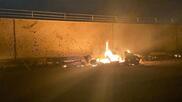
Major General Qassem Soleimani, the commander of the Quds Force of Iran’s Islamic Revolution Guards Corps (IRGC), and Abu Mahdi al-Muhandis, the second-in-command of Iraq's Popular Mobilization Units (PMU), have been assassinated in US airstrikes in the Iraqi capital Baghdad.
The IRGC announced in a statement on Friday morning that Major General Soleimani and al-Muhandis were martyred in an airstrike. The Iraqi pro-government group also confirmed the incident.
"The deputy head of the Hashed, Abu Mahdi al-Muhandis, and head of the Quds Force, Qasem Soleimani, were killed in a US strike that targeted their car on the Baghdad International Airport road," it said in a statement on Friday.
"The American and Israeli enemy is responsible for killing the mujahideen Abu Mahdi al-Muhandis and Qassem Soleimani," said Ahmed al-Assadi, a PMU spokesman.
The group had earlier said that its public relations director Mohammed Reza al-Jaberi and four other members of the group were also killed after three Katyusha rockets struck a military base next to Baghdad International Airport in the Iraqi capital.
The media bureau of the voluntary forces – better known by the Arabic word Hashd al-Shabai – described the early Friday morning attack as a "cowardly US bombing”.
The rockets landed near the air cargo terminal, burning two vehicles and injuring several people, the Iraqi Interior Ministry's Security Media Cell said in an earlier statement.
Shortly after the attack, US officials, speaking on condition of anonymity, told Reuters that the strikes were carried out against two targets linked to Iran in Baghdad. The officials declined to give any further details.
Meanwhile, security sources, speaking on condition of anonymity, told AFP that eight people were killed in the attack.
The development came as the United States military said on Sunday it had carried out strikes in western Iraq against Kataib Hezbollah group, which is part of the pro-government Popular Mobilization Units – better known by the Arabic word Hashd al-Sha’abi.
Iraqi security sources said at least 25 fighters were killed and at least 55 wounded following the air attacks.
Senior Iraqi officials also condemned the US attack against the Kataib Hezbollah's positions as a "violation of Iraqi sovereignty".
Caretaker Iraqi Prime Minister Adel Abdul Mahdi called the move a “dangerous escalation that threatens the security of Iraq and the region” in a statement on Sunday.
Abdul Mahdi said US Secretary of Defense Mark Esper had called him about half an hour before the US raids to tell him of the US intentions to hit Kataib Hezbollah's bases. He said he asked Esper to call off US plans.
Iraqi caretaker President Barham Salih also condemned the attack.
The US raids drew a wave of condemnation from officials and movements across the region, and triggered furious public protests outside the US embassy in Baghdad.
The Pentagon said the bombings were in response to attacks targeting American forces near the oil-rich northern Iraqi city of Kirkuk last week, which reportedly killed a US civilian contractor and injured four US service members, as well as two members of the Iraqi security forces. The US accused Kataib Hezbollah group of the attack.
Iran has warned that “harsh revenge" is waiting for the US following the strike that killed the leader of the Quds Force.
The IRGC announced in a statement on Friday morning that Major General Soleimani and al-Muhandis were martyred in an airstrike. The Iraqi pro-government group also confirmed the incident.
"The deputy head of the Hashed, Abu Mahdi al-Muhandis, and head of the Quds Force, Qasem Soleimani, were killed in a US strike that targeted their car on the Baghdad International Airport road," it said in a statement on Friday.
"The American and Israeli enemy is responsible for killing the mujahideen Abu Mahdi al-Muhandis and Qassem Soleimani," said Ahmed al-Assadi, a PMU spokesman.
The group had earlier said that its public relations director Mohammed Reza al-Jaberi and four other members of the group were also killed after three Katyusha rockets struck a military base next to Baghdad International Airport in the Iraqi capital.
The media bureau of the voluntary forces – better known by the Arabic word Hashd al-Shabai – described the early Friday morning attack as a "cowardly US bombing”.
The rockets landed near the air cargo terminal, burning two vehicles and injuring several people, the Iraqi Interior Ministry's Security Media Cell said in an earlier statement.
Shortly after the attack, US officials, speaking on condition of anonymity, told Reuters that the strikes were carried out against two targets linked to Iran in Baghdad. The officials declined to give any further details.
Meanwhile, security sources, speaking on condition of anonymity, told AFP that eight people were killed in the attack.
The development came as the United States military said on Sunday it had carried out strikes in western Iraq against Kataib Hezbollah group, which is part of the pro-government Popular Mobilization Units – better known by the Arabic word Hashd al-Sha’abi.
Iraqi security sources said at least 25 fighters were killed and at least 55 wounded following the air attacks.
Senior Iraqi officials also condemned the US attack against the Kataib Hezbollah's positions as a "violation of Iraqi sovereignty".
Caretaker Iraqi Prime Minister Adel Abdul Mahdi called the move a “dangerous escalation that threatens the security of Iraq and the region” in a statement on Sunday.
Abdul Mahdi said US Secretary of Defense Mark Esper had called him about half an hour before the US raids to tell him of the US intentions to hit Kataib Hezbollah's bases. He said he asked Esper to call off US plans.
Iraqi caretaker President Barham Salih also condemned the attack.
The US raids drew a wave of condemnation from officials and movements across the region, and triggered furious public protests outside the US embassy in Baghdad.
The Pentagon said the bombings were in response to attacks targeting American forces near the oil-rich northern Iraqi city of Kirkuk last week, which reportedly killed a US civilian contractor and injured four US service members, as well as two members of the Iraqi security forces. The US accused Kataib Hezbollah group of the attack.
Iran has warned that “harsh revenge" is waiting for the US following the strike that killed the leader of the Quds Force.
Page: 2 - 1
